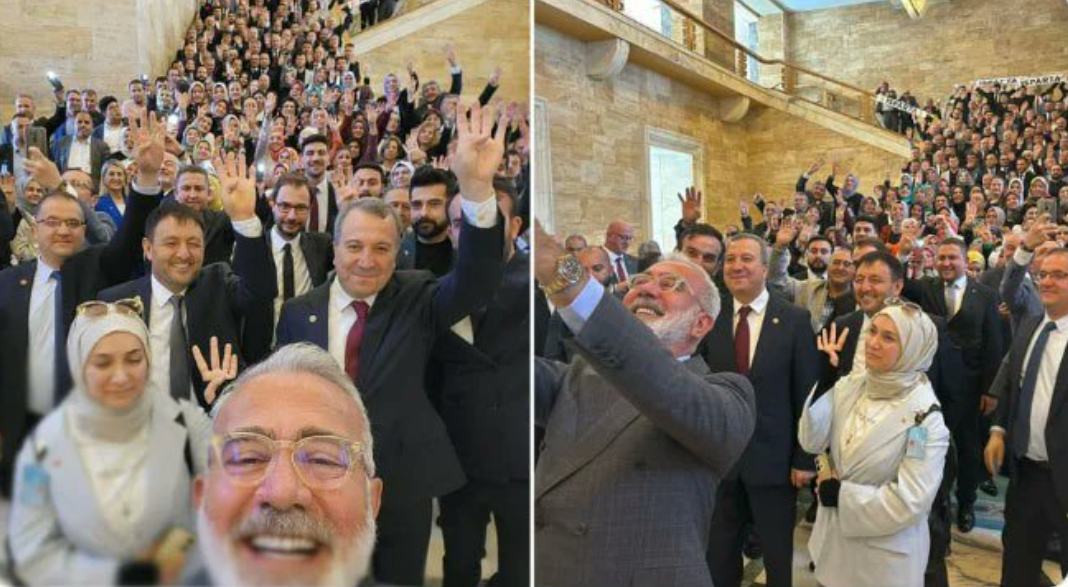Public unhappiness with members of Turkey’s ruling Justice and Development Party (AKP) is growing due to their extravagant lifestyles amid the country’s ongoing economic woes.
Recent incidents involving expensive watches and business jets have highlighted the stark contrast between the lifestyle of some AKP deputies and the needs of the people.
The Rolex controversy
Bahadır Yenişehirlioğlu, deputy leader of the AKP parliamentary group, recently came under fire after posting a photo on social media of himself wearing a Rolex watch worth around 562,000 Turkish lira ($17,270).
The caption “We ourselves are the people” juxtaposed with the luxury item sparked a flood of negative reactions online, prompting Yenişehirlioğlu to delete the post.
This incident highlights a significant disparity, as the watch costs almost 33 times the monthly salary of a minimum wage earner in Turkey, who earns 17,002 lira and would have to work for almost three years without spending money on anything else to be able to afford such a watch.
Spending on business jets and public criticism
Another controversy was sparked when Parliament Speaker Numan Kurtulmuş used a state-owned business jet for a family trip to Mardin. The trip took place shortly after government officials, including Vice President Cevdet Yılmaz, publicly emphasized the need for austerity in public spending.
The contradiction between the government’s austerity messages and Kurtulmuş’s actions has not gone unnoticed and has attracted criticism from both the public and other members of the government.
Broader pattern of excesses
The incidents involving Yenişehirlioğlu and Kurtulmuş are not isolated cases. Last week AKP MP Şebnem Bursalı from İzmir was criticized for sharing photos of a lavish meal in Monaco, a city known for its opulence. Bursalı’s social media post, which showed a lobster dinner that cost 60 euros — about 12 percent of Turkey’s minimum wage — came at a time when Turkey is struggling with a severe economic downturn marked by annual inflation of 68.5 percent last month.
Overhaul of government spaces
The trend of lavish spending extends not only to personal accessories and travel but also to the offices of government officials. The newly appointed governor of Adana, Yavuz Selim Köşger, recently made headlines with his extensive renovation of the governor’s mansion. Upon taking office, Köşger replaced a variety of items, from mundane plates and forks to more important elements such as air conditioners and toilets, a move that was criticized for its apparent excessiveness. The replacements were sourced from various cities, including İzmir and Konya, reflecting a pattern of spending that favors the new over the necessary.
Following the transfer of power from the AKP to the Republican People’s Party (CHP) in last month’s elections, the Denizli Municipality also demonstrated the extravagance of the AKP elite by displaying 45 vehicles that were not deemed necessary for the operation of the municipality but were used to provide comfort to AKP-led municipal employees, including several luxury models. The new administration pointed out that the municipality could save more than 1 million Turkish lira every month by returning these vehicles, highlighting the unnecessary luxury that burdened the city’s budget under the previous leadership.
Official response and public reaction
In response to these controversies, President Recep Tayyip Erdoğan criticized the ostentatiousness of his party’s members, stressing that such appearances are not in line with the party’s values.
“There is no arrogance in our discourse,” Erdoğan said at a recent AKP parliamentary group meeting. “We do not do politics to give privileges to some people, to distribute offices and titles.”
Erdoğan’s admonition would prove futile, however, considering that the president himself is criticized for his lavish lifestyle. His billion-dollar, 1,150-room presidential palace and many other residences built across Turkey make headlines for extravagant, six-figure daily expenses.
Erdoğan’s declaration of modest wealth in June did little to dispel longstanding rumors and allegations of immense wealth acquired through illegal means.
Critics have long accused the AKP under Erdoğan’s leadership of illegally amassing personal fortunes, in stark contrast to Erdoğan’s humble proclamation in the 1990s about his possessions being limited to his wedding ring when he was a young and fiery politician from the Islamist Welfare Party.
A corruption probe in 2013, implicating Erdoğan and his inner circle, marked a turning point, with the government’s response culminating in a purge of the judiciary and law enforcement.
The pivot not only neutralized immediate threats to Erdoğan’s rule but also laid the groundwork for an era characterized by diminished accountability and increasing accusations of cronyism, bribery and the extravagance that comes with it.
Dissatisfaction among the people continues to grow, especially given the country’s economic plight and the financial woes of citizens. The contrast between the lifestyle of the AKP elite and the daily struggles of average Turks is fueling a broader discussion about how Erdoğan and the AKP are draining Turkey’s resources while the people have to make do with the leftovers.



